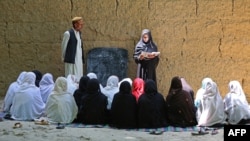Saliha began taking online classes after she lost hope of returning to school to pursue her dream of becoming a doctor in Afghanistan.
She was in ninth grade when U.S.-led forces withdrew from the country and the Taliban seized power in August 2021, banning girls' secondary education.
"I used to dream of finishing school and going to university," said Saliha, 18, who did not want her family name to be revealed for security reasons. "But now, considering all the limitations, my hope is just to have any kind of education, whether via online courses or underground school."
With the Taliban's ban on secondary education in its fourth year, some Afghan girls and young women like Saliha are looking for an alternative source of education.
According to the United Nations, more than 1.4 million girls in Afghanistan have been affected by the ban.
Under the Taliban, women are barred from receiving a university education, working with government and nongovernmental organizations, and going to public places, such as parks, gyms and beauty salons.
Like other Afghan girls and young women, Saliha and her four sisters must remain at home, but, she said, she is determined to continue her education.
"I saved every penny to purchase a computer and pay for the internet," she said, to continue learning online.
But not all Afghan girls and women can afford to take online courses.
In 2022, only 6% of women had internet access in Afghanistan, compared with 25% of men, according to Gallup.
Flexibility required
Pashtana Durrani, founder of LEARN Afghanistan, a digital school network in the country, told VOA that because of Afghans' varying degrees of access, her organization provides different education models.
"A one-size-fits-all approach does not work in Afghanistan. The key is being flexible and responsive to each community," said Durrani.
In addition to offering online classes, Durrani's organization runs underground schools in six provinces, educating some 700 girls.
But, she said, there is a need to work with local elders to ensure more girls attend these classes.
Meetra Alokozay, executive director of Sahar Education, a nonprofit working to empower women in Afghanistan, told VOA it was essential that men support female family members to attend either online or underground classes.
"We want men to support their daughters and sisters in pursuing an education," said Alokozay.
But, she said, the Taliban's return to power affected the education system in Afghanistan.
UNESCO reported that the number of girls and boys enrolled in primary school dropped from 6.8 million in 2019 to 5.7 million in 2022.
The ban has already taken a toll on girls and women.
A primary school teacher in Kabul, who requested anonymity for fear of reprisals, told VOA that after the Taliban's takeover in 2021, parents withdrew some of her students from school even before they finished the sixth grade.
"Shortly after, they were both married off. I don't remember their exact age, but I do know they were no older than 13 years," added the teacher.
Mental health problems
A report by exiled Afghan human rights watchdog Rawadari this month said that girls in Afghanistan are experiencing a deterioration in mental health and an increase in suicide attempts, in addition to being forced into marriage.
"As a result of the ban on women's education, violence against women increased, which has made life difficult for girls and women" in Afghanistan, the report said.
Sahar Education's Alokozay said, "Raising awareness about what's going on in Afghanistan is crucial. Many people, even in the U.S., are unaware of the situation."
Saliha urged the international community "not to leave Afghan girls alone."
"Think about us, write about us, give us opportunities to learn, and help us fight this system," she said. "If one door closes, help us find another."
This story originated in VOA's Afghan Service.




